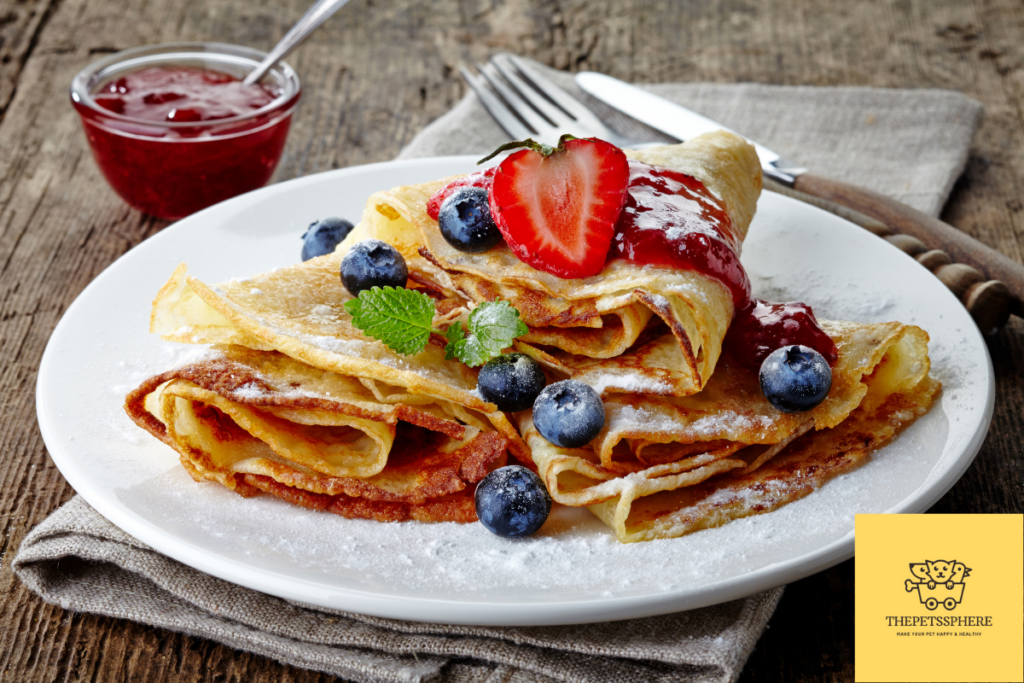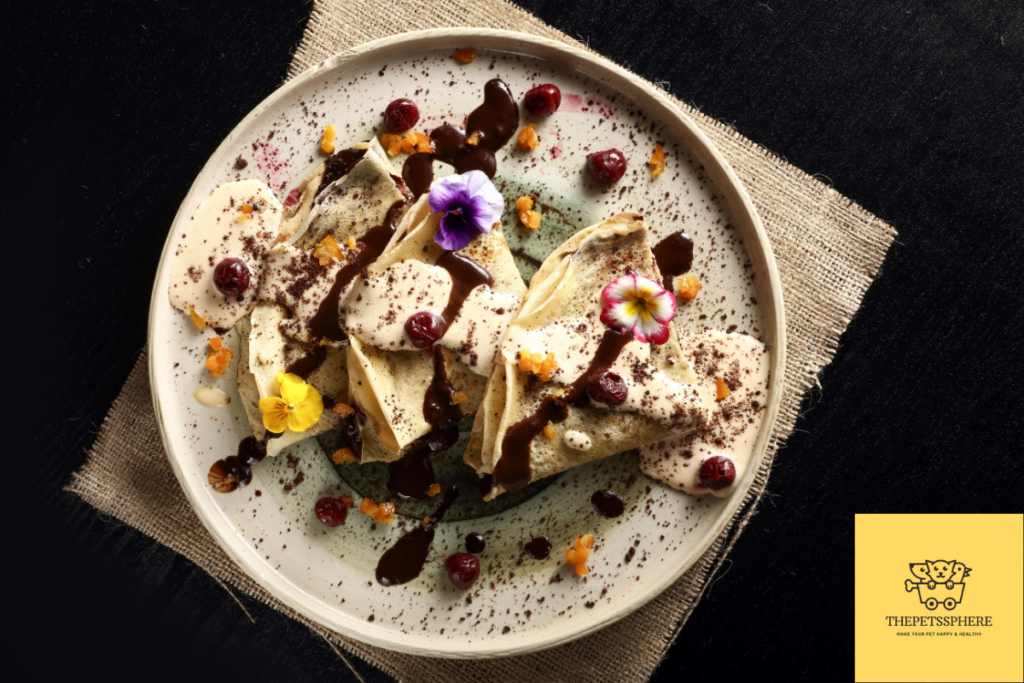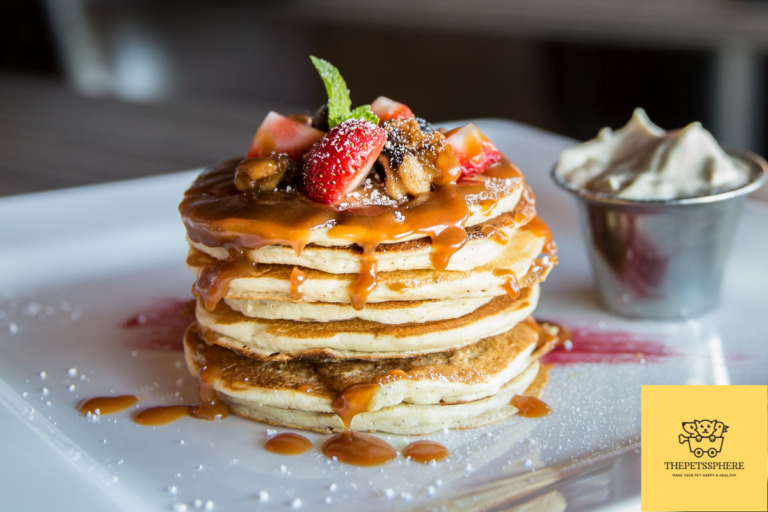Cats can be very picky eaters, and many pet owners have found that their cats will only eat certain foods. We can’t blame them! Cats are creatures of habit and can get bored of the same food day after day. One such food is pancakes, which can be offered to your cat as a treat from time to time.
Cats can eat pancakes but should do so in moderation to avoid weight gain and other health problems. Make sure that your cat has a healthy, balanced diet as well- it can help prevent illnesses like diabetes!
This article will talk about whether or not it’s safe for cats to consume pancakes, how you can offer up this delicious breakfast treat to your feline friend, and more!

Are Eggs in Pancakes safe for Cats?
Cats are a very popular pet and it is no surprise that they need to be taken care of just like any other animal. One way to take care of your cat is by providing them with healthy food options such as eggs in pancakes for cats. Eggs provide many health benefits.
Let’s look at those:
1) Your cat will have more energy
Cats require protein in their diet to maintain their energy levels and eggs are an excellent source of protein! Eggs contain all 9 essential amino acids which help make a complete protein source for your furry friend.
2) Healthy bones
100 gm of Pancake supplies 219 mg of Calcium. Calcium helps build strong, healthy bones and teeth which can protect against diseases like arthritis or heart disease later on in life. Feeding your cat eggs can help maintain their healthy bones and teeth.
3) Eggs in pancakes
Eggs can be an occasional treat for your cat, but it is important to remember that the food should not make up more than ten percent of their total diet so they can get all the nutrients they need from other sources as well! Eggs are a great source of protein, but can also provide calcium, so make sure that your cat is getting a balanced diet!

Can Cats Eat Vegan Pancakes?
Some people believe that cats should eat vegan pancakes. However, there are a few reasons why this might not be the best idea. Here are 3 of them:
1) Cats need meat to survive because it contains taurine which is an essential amino acid. Vegan pancakes do not contain any of this.
2) Cats may get a lack of protein if they consume only carbohydrates like wheat and oats, which can lead to health problems and weight gain in the long run.
3) Animal products provide iron, zinc, calcium, and vitamin D- nutrients that can be nonexistent or low in vegan foods.
Can Cats Eat Pancakes with Butter?
Cats should not eat pancakes with butter.
Butter contains lactose which most cats cannot tolerate due to lactose intolerance.
Butter also contains more calories than any other type of fat and because most cats don’t need extra calories in their diet. The high content of saturated fats in butter can lead to health problems like heart disease if consumed regularly by your kitty.
You can make a simple substitute for butter by combining equal parts of olive oil or pumpkin puree depending on your preference. This will work as a healthier alternative to butter that is less likely to cause weight gain.
Can Cats Eat Pancakes with Bananas?
Did you know that cats can eat pancakes with bananas? In fact, there are many reasons why they might enjoy this food. Read on for three possible explanations.
1) Pancakes with bananas make a great alternative to traditional wet food because they contain more water than dry food does which is better for cats that have urinary problems or kidney disease.
2) Pancakes with bananas contain pectin, which helps promote digestive health by making the stool softer and easier to pass through the intestines, as well as reducing colon cancer risk in humans and animals.
3) Banana peels have been shown to be beneficial in reducing the symptoms of arthritis, canker sores, and heartburn.
Can Cats Eat Pancakes with Soy Milk?
Yes, you can offer your cat pancakes made from soy milk by replacing cow’s milk in the recipe for a healthier alternative to traditional pancake batter! Just make sure that the soy milk is unsweetened and unflavored so it can keep both its nutritional value and flavor.
Can Cats Eat Pancakes and Syrup?
Did you know that a cat’s pancreas doesn’t produce enough of the enzyme amylase to break down carbs? This means that every time your furry friend eats something sweet like pancakes with syrup, they are consuming large amounts of sugar without being able to digest it. If you want your kitty to live a long and happy life then make sure they only eat healthy food!
There are three reasons why cats shouldn’t eat pancakes with syrup
1) The high sugar content can cause diabetes in cats just as it does for humans. These types of foods have high quantities of fat and cholesterol which can lead to weight gain or health problems such as diabetes, heart disease, and arthritis.
2) Syrup has no nutritional value for a cat and may lead to weight gain or obesity.
3) Cats have more sensitive stomachs than humans and the syrups could irritate their intestines if consumed repeatedly. If you want to share some of your food from time to time, I recommend feeding them chicken or fish instead of pancakes.
How to Feed Pancakes to Your Cat Safely?
Cats are finicky creatures. They will eat anything if they get hungry enough but they also have specific needs when it comes to food. Cats need a diet that is high in protein, low in carbohydrates and fat, and moderate in moisture content. With this being the case, it’s always nice to find new ways of feeding your cat delicious foods that they would never be able to resist!
Now we will go over how you can feed pancakes to your cats safely so that you can share something special with them while following their dietary needs at the same time.
- Mash up the pancakes into small pieces. This can be done by hand or with a blender if you have one. The smaller the better!
- Sprinkle some butter on top of them to make it more appetizing for your cat and add in any fruit they might enjoy such as bananas, berries, apples, etc.
- Offer the pancakes to your cat cold or warmed up.
- If you can’t find a way that works for you, it’s always best to ask your veterinarian about how they recommend feeding cats and what foods can be offered in their diet! Oh and don’t forget to give them lots of love while playing with them too! Your kitty can’t resist this!
3 Delicious Healthy Recipes for your Kitty Cat
Introducing 3 healthy recipes for pancakes for your cats. These recipes are fun and easy to make as well as nutritious for your kitty cat.
Choose from these three delicious recipes:
Recipe 1:
2 eggs, ¼ cup flour, and 3 tablespoons of milk. Beat the eggs together then mix in the flour and milk until it becomes a pancake-like batter. Let this mixture sit for 5 minutes before cooking on a griddle with butter or oil. For toppings add cinnamon and sugar to taste!
Recipe 2:
3 cups of whole wheat flour, 1 egg, ¾ cup water (may need more depending on how thick you like your batter), ½ teaspoon salt, 1 tablespoon vegetable oil (or melted coconut oil). Mix all ingredients together thoroughly. Pour batter into the pan and cook on medium-low heat.
For toppings add cinnamon, peanut butter or almond butter to taste!
Recipe 3:
½ cup of Whole Wheat Flour + ½ tsp baking powder + ¼ teaspoon salt + ¾ cup any vegetable oil + ¾ cup can water. Mix dry ingredients together, then add wet ingredients. Mix thoroughly to make a pancake-like batter. Add water and olive oil in the same ratio of ½ plus ¼. Pour onto griddle or pan and cook on medium heat until done.
Note: Some cats can be allergic to gluten which is found in wheat flour.
More articles on what cats can eat
- Can cats eat raw chicken fat
- Do cats eat bread
- Do cats eat popcorn
- Do cats like evaporated milk
- Why don’t cats get sick from eating mice
- Is lobster safe for cats
- Do cats like chicken nuggets
- Could cats eat bologna
- Do cats eat cheerios
- Can cats have pine nuts
- Will cats eat imitation crab
- Should cats drink chocolate milk
- Can cats have zucchini bread
- Does cats eat beef jerky
- Are figs safe for cats
- Could cats eat oranges
- Can cats eat raw cashews
- Do cat eat frogs
- Will cats eat pizza
- Do cats eat parsley
- Can cats have vanilla pudding
- Are radishes poisonous to cats
- Can cats eat green beans
- Do cats like dog treats

